Wednesday, February 28, 2007
Tuesday, February 27, 2007
While I'm in China...

Monday, February 26, 2007
Whence Comes God's Pain in Labor (Isaiah 42)?

What is the source of God's labor pain in Isaiah 42:14? If the metaphor of labor fully applies to God's creative new restorative work in 2 Isaiah (as my post yesterday suggested), then this restorative work somehow involves groaning and suffering for God! How does this work?
Dr. Claassens in her paper interpreted God's pain in labor as God's work of entering into the trials and trauma of the people, who have been exiled to Babylonia as prisoners of war. In my response to her paper, I suggested another possibility that to me seems more in keeping with the overall theology and thinking of 2 Isaiah.
I suggested that the metaphor of God's labor pains in Isaiah relates to the pain to which a stance of vulnerability exposes one. When one lets go of control, puts aside the ego-self, drops one's guard on behalf of something greater than the self, then one is almost guaranteed to be in for great pain.
In 2 Isaiah God is seen to put aside God's right to justice, to put aside what's fair and deserved. Others should be doing their part, but God ends up having to pull everyone else's weight for them (cf. Isaiah 41:28; 59:16; 63:5). When you embrace other-centeredness, you often get "burned," you take the "fall," you open yourself up to misunderstanding and deep rejection precisely at a point where you have exposed your soft flesh. Is that the nature of the "pain" that God is feeling here in Isaiah 42?
Sunday, February 25, 2007
God "Like a Woman in Labor" (Isaiah 42)

I mentioned in Friday's post that I had given a brief response at the mini-conference of the Washington Consortium Bible Group held here on the VTS campus. The presenter was Dr. Juliana Claassens and the paper looked at the image of God in Isaiah 42. I won't give the entire paper away here, of course, as it is part of a larger publishing project that will appear in print. I do want to record that I loved the argument that the text uses the image of God in the pains of birth and labor as a marvelous rhetorical strategy.
God has seemed to be silent for so long, as the people have waited in Babylonian exile. Isaiah's audience must have had deep suspicions that God might be rather powerless. God must have seemed likely unable to turn their situation around. But what if God is "like a woman in labor" (Isaiah 42:14). If God is at the point of birthing new life, then a lot has been going on for months without it being apparent to the people. Then God's seeming powerlessness and helplessness is actually a means of doing something quite powerful indeed.
A woman's helplessness and frailty during labor is nothing less than power, the power to bring about new life--something a "powerful" male cannot do! This theological theme that vulnerability and frailty is a source of true, marvelous power is a big one throughout Isaiah 40-66. I think Juliana is really on to something here.
Perhaps I'll add a bit more to this discussion tomorrow morning. There are some powerful and exciting ideas here...
Saturday, February 24, 2007
Biblical Studies Carnival XV Call for Submissions
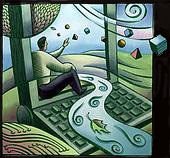
Anything on this blog caught your eye this month? Why not nominate it for the upcoming Carnival of Bible Blogs to be hosted on Charles Halton's Awilum blog (click here). It is easy to nominate/submit a post for the carnival. Simply use the quick submission form at BlogCarnival.com or email them to biblical_studies_carnival AT hotmail DOT com. Why not make a nomination right now?
Friday, February 23, 2007
Home Stretch

Thursday, February 22, 2007
Lent 1, Year C: Deuteronomy 26:1-11

The appointed lesson for this coming Sunday, the first Sunday in Lent, Year C, is Deuteronomy 26:1-11. The passage is about bringing some of the harvest fruits and offering them to God. It is about intentionally remembering God's mighty acts on behalf of us, raising up the people of Israel from meager beginnings.
In the theology of Deuteronomy, full life and full joy come from keeping covenant, from keeping God in the place of covenant-lord (suzerain). With God as covenant lord, we are freed from selfishness and egocentricity. With our fellow human beings as co-partners (co-vassals) in the covenant, we are freed to enjoy full human mutuality with our friends and neighbors.
Notice how Deuteronomy 26 charges us to recall and recite our history as God's people. No matter how much we may prosper, keeping ourselves focused on God's grace connects us to the divine source of our life. It charges and empowers us spiritually, allows us to grow in discipleship.
Along with reciting the faith history, bringing offerings from the harvest helps us strengthen our recognition of God's covenantal suzerainty ("lordship"). Deuteronomy 26 makes clear that God is lord of nature and physicial sustenance, not just lord of history. In this theology of Deuteronomy, we make God lord of every facet of existence. We don't compartmentalize life, recognizing God's power in one part but not in another.
The communal dimension of all this is central. A proper "vertical" relationship with God generates proper "horizontal" relationships within community. Verse 11 mentions the extended household, the the Levite, and the alien. These are core societal elements out of which Israel as an entire people is built up. The covenant of Deuteronomy upholds these elements, including the "weakest links" at society's edge. The good life is a shared journey, where we all recognize each other's full humanity and draw strength from our God-given mutuality.
Wednesday, February 21, 2007
Sad and Difficult Results from the Anglican Primates Meeting

Tuesday, February 20, 2007
The Chronicle: "Questions of Faith"
 My faculty colleague, Dr. Roger Ferlo, has sent a link to a new article in the Chronicle of Higher Education by Barbara Brown Taylor. Taylor is a well-known homilist, thinker, and writer within the Episcopal Church, who does terrific work with preaching both testaments of the Christian Bible. The essay is entitled, "Questions of Faith," and it appeared February 16th.
My faculty colleague, Dr. Roger Ferlo, has sent a link to a new article in the Chronicle of Higher Education by Barbara Brown Taylor. Taylor is a well-known homilist, thinker, and writer within the Episcopal Church, who does terrific work with preaching both testaments of the Christian Bible. The essay is entitled, "Questions of Faith," and it appeared February 16th. The essay is fascinating, relating the story of how Taylor came to teach religion at Piedmont college after experiencing some of the frustrations of the life of a parish priest, especially the frustration of not being able to wrestle with real theological issues in the parish, to ponder the questions that had lead her into the ministry in the first place. Personally, I very much empathize with Taylor's love of academe and the life of the teaching professor.
You know you are incredibly lucky or blessed to be a seminary professor when you read Taylor's description of the real job of a parish priest:
I spent most of my time essentially managing a small business, with all of the fiscal, physical-plant, and personnel issues that such a job entails. I also gave long hours to caring for people in crisis, and while those hours were well spent, there were few left over to ponder the questions that had led me into the ordained ministry in the first place. I read fiction for the 15 minutes each night that I could keep my eyes open. When church members and I chose topics for Christian education, we favored those that made us feel more secure in our faith instead of those that might challenge our understanding of ourselves.
Reluctantly I accepted the fact that my job had more to do with providing a safe place for people to raise their children and strengthen their beliefs than it did with exploring the theological territory. Most people counted on me to provide answers and not to ask more questions. That made a lot of sense — who wants a provocateur teaching the 12-year-olds or tipping the canoe during Bible study? — but at the same time, I found the life of my mind growing thin.
Monday, February 19, 2007
Rivers of Babylon

We have been discussing the Babylonian Exile in my Ezekiel class this term, and Todd V. who is in the class was reminded of a song, "Rivers of Babylon," which he just emailed me.
It is done by The Melodians in the Reggae genre, and is quite catchy. The Jamaican vocal trio, with their island-version of 70s R & B, has a sweet, harmonic Reggae style.
The Lyrics are as follows:
By the rivers of babylon, there we sat down
Ye-eah we wept, when we remembered zion.
By the rivers of babylon, there we sat down
Ye-eah we wept, when we remembered zion.
When the wicked
Carried us away in captivity
Required from us a song
Now how shall we sing the lords song in a strange land
When the wicked
Carried us away in captivity
Requiring of us a song
Now how shall we sing the lords song in a strange land
Let the words of our mouth and the meditations of our heart
Be acceptable in thy sight here tonight
Let the words of our mouth and the meditation of our hearts
Be acceptable in thy sight here tonight
By the rivers of babylon, there we sat down
Ye-eah we wept, when we remembered zion.
By the rivers of babylon, there we sat down
Ye-eah we wept, when we remembered zion.
By the rivers of babylon (dark tears of babylon)
There we sat down (you got to sing a song)
Ye-eah we wept, (sing a song of love)
When we remember zion.
(yeah yeah yeah yeah yeah)
By the rivers of babylon (rough bits of babylon)
There we sat down (you hear the people cry)
Ye-eah we wept, (they need their God)
When we remember zion. (ooh, have the power)
Sunday, February 18, 2007
Signs of Tension at the Primates Meeting

Saturday, February 17, 2007
The Anglican Primates Meeting
If any readers want to post comments on news that they have on this meeting and their reactions to it, you are welcome to use the comments section below. Dave Walker on his cartoon blog is reporting that the primates have found that the Episcopal Church has met much of the Windsor Report requirements and that anti-ECUSA bloggers are angry about this finding.
Here is one of his cartoons:

HT: cartoon blog
Retirement of Mary Hix from VTS

Friday, February 16, 2007
Ezekiel and the Holy

Bruce Metzger, 1914-2007

Metzger, a Presbyterian, was the George L. Collord Professor Emeritus of New Testament Language and Literature at Princeton Seminary. He earned a bachelor's degree from Lebanon Valley College in 1935, a bachelor of theology degree from Princeton Seminary in 1938 and a doctorate in classics from Princeton University in 1942. Metzger began his teaching career at Princeton in 1938, where he stayed in the New Testament department for 46 years.
Thursday, February 15, 2007
Last Sunday of Epiphany, Year C: Exodus 34:29-35


Wednesday, February 14, 2007
"You Got People" (Jeremiah 22:1-5)

Our OT 202 Hebrew Reading class has just finished Jeremiah 22:1-5, and we were discussing the meaning of the idiom "your people" in the diction of the passage. Jeremiah is not just issuing warnings to Judah's kings. He is clear with the king that the problems in Judean society also lie with "your people" (22:2).
What does Jeremiah mean with his term "people"? Does it include all royal subjects? Are they Judah's rural elders (cf. 2 Kings 21:24)? Are they the army (cf. 1 Kings 16:16; 20:10)? None of these answers really works. The king's "people" are allowed through the gates of the royal palace (22:2, 4), something not permitted to common people, competing power blocks of society, or the army. I think a clue to Jeremiah's meaning can be found in the recent H & R Block ad campaign (see image above).
Verse 22:3 makes it pretty clear that "your people" are those with some degree of authority and social power who support the king's policies and benefit from them as his patrons. Not everyone in society counts as patrons, as "paid" supporters--as "people."
Jeremiah is defending those folks in society who cannot say, "We've got People" or "We are People." He is standing up for those who generally fall through the various nets of support that keep folks safe, warm, and alive.
This passage made the class wonder who are those today who feel that they have "no people" backing them up. To what extent do we, the well-off, participate in networks and structures of power and support that leave other folks marginal, un-nurtured, and unprotected?
Tuesday, February 13, 2007
Finally, a Name for our Daughter

Update on our Journey toward Parenthood:
We leave for China in about two weeks, on Wed February 28th. Thus I will actually miss the MAR-SBL. First things first, and this journey is a major, major event in the lives of me and Catherine. Any readers of this blog who are interested in the journey can certainly follow it on our other blog. I'll post the link again before we go. I should have internet access in China. Also, while I'm gone would any of you like to help keep this blog running? If you might be able to help even just a little, shoot me an email or leave a comment below. Thanks!
The name Ketziah is from the last chapter of the book of Job.
Job gave his daughters names that expressed extravagant love and joy. This name means "Spice" in Hebrew, and Rebecca comes from the Sichuan provence of China, known for its very spicy, hot food...
Monday, February 12, 2007
Diversity in Faith
Labels: Video
Participant Index for MAR-SBL Conference

I have just posted the full participant index for our MAR-SBL conference, March 1-2, on-line at our regional WebSpace. Now you do not have to scan the whole program to find where you appear, or where your friend appears! To download the participant index directly (a PDF document), click here.
Labels: mar-sbl
Sunday, February 11, 2007
Speaking of Flamingos...

They found the bird in a shoe shop in St. Armands Circle in Sarasota, FL. Well Done!
Saturday, February 10, 2007
Jeremiah 17, continued (6 Epiphany, Year C)
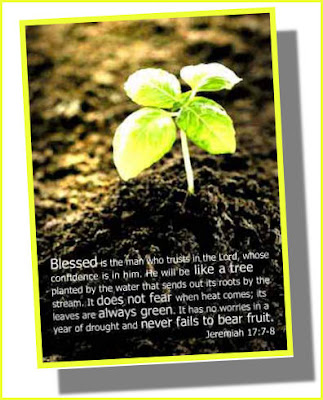
Let us continue with a few more thoughts on this Sunday's appointed reading (the sixth Sunday after Epiphany, Year C), Jeremiah 17:5-10. For my preceeding post on this text, click here. (Note that PamBG has added some neat remarks to the post in the "comments" section there.)
Yesterday, Dr. Jim West wrote a sort of "reverse version" of Jeremiah 17, adapted to soothe modern souls. To take a look, click here. At vv. 8-9 Jim speaks of how modern souls resist "authentic self awareness and a painful recognition [of being], above all else, quite sinful." Unlike modern people, however, the two testaments of the Bible along with the literature of the ancient world were keenly aware of the universal fallenness of humanity. Sharing this insight, Jeremiah 17:9 accounts for why so many of us choose a form of life destined for frustration.
Why do we seem to consciously choose to be like bushes in the desert, disconnected from God's waters of life? Why can't we see the world working the way God intends it, so that it is obvious to all of us that true joy comes only from rooting ourselves in God?
It must partially be because in our fallenness we have collectively thrown the world off kilter and gotten our hearts and minds "desperately sick." Thanks be to God that Jeremiah 17 shows us a vision of the world struggling to right itself, fighting to throw off disease and to come back into health. God's truth abideth still.
Neat Link: Holy Land Maps and Sites
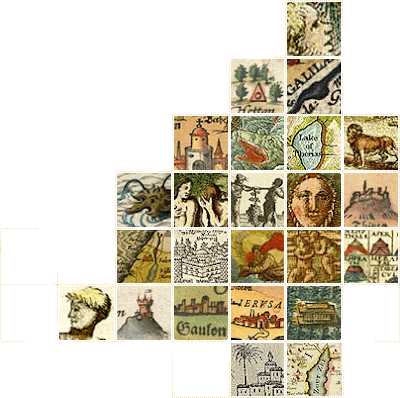
Friday, February 09, 2007
The Seminary Love Affair With Flamingos
Well, recently Valerie Hayes, an M.Div. Junior here at VTS sent around a link to this wonderful flamingo merchandise site, Flamingo Mania. Do give it a gander!
While we are on the topic, here are a few picks from my growing collection of flamingo images:

Complete MAR-SBL Program Now On-Line

I have just posted the full program schedule for our MAR-SBL conference, March 1-2, on-line at our regional WebSpace. To download the schedule directly (a PDF document), click here.
We have also extended the deadline for discount registration to Feb 23rd, and made it available on line (to SBL as well as AAR members). To access on-line registration, click here. Please feel free to post questions using the "comments" function. Thanks!
Labels: mar-sbl
Thursday, February 08, 2007
6 Epiphany, Year C: Jeremiah 17:5-10

Jeremiah 17 anticipates Jesus' message in the Gospel reading paired with it this Sunday. As in Jesus' "beatitudes," Jeremiah lets us in on how the world is really wired, and how to experience true joy by getting our lives aligned with what is really real. Jeremiah 17 presents a choice: will we live wisely and joyfully? Or, will we push ahead with a lifestyle destined for frustration and isolation from the sources of true joy in life, eventually turning us into a "barren bush in the desert"?
There is a deep scandal to Jeremiah 17: It runs up against what the world usually considers to be the actual, pragmatic way of happiness and success. Prof. James Crenshaw at Duke Divinity School has actually recently called Jeremiah 17 “fantasy,” “whistling in the dark,” and a “dangerous lie”! In real life, visible prosperity does not always flow from trust in the Lord. An unjust fortune does not always forsake an evildoer in the midst of his days (Jeremiah 17:11).
Is Jeremiah 17 a fantasy and a lie? Hardly! The lesson does not deny that human sin is a frustration for God. It admits that times of parching heat will come, times of devestating drought (17:8). Nevertheless, one can find "beatitude"--that is, "wholeness" and "fulfillment"--in the midst of adversity. In fact, sometimes, our wholeness, fulfillment, and solid rootedness in God are most easily visible to us at such times. And Jeremiah 17 describes a true propensity of existence as God has created it. Like a sail-boat weighted down on one side, human existence tilts and lists toward righteousness. The dice are loaded in favor of righteousness; injustice is on borrowed time.
In a recent sermon, my student Elizabeth Felicetti (click here) put it this well. A lifestyle centered on autonomous living, self-centeredness, and self-direction must ultimately prove frustrating, self-defeating. It is in the very nature of human beings that we thrive only in truly human, communal mutuality of persons.
Jeremiah bids readers to align their communal life with the patterns of God, the patterns of wholeness and righteousness. Rather than kick against the grain of history, we are bidden to allow God's patterns of joyful living to come into their own, and set history hastening toward righteousness. God's wind is blowing across the sea of life. To live well, to get in synch with what will bring joy, we need to open our sails and catch this wind!
Wednesday, February 07, 2007
The Archaeology of Worship
Baltimore Hebrew University is pleased to announce a landmark conference, co-sponsored by ASOR and SBL, on The Archaeology of Worship in Biblical Israel, April 22-23, 2007. For information and registration forms, click here (PDF file). Contact Dr. Barry M. Gittlen at gittlen@bhu.edu or (410) 578-6907 for questions or further details.
Graduate students please note the call (page 5) for submission of proposals for a poster session. The deadline for receipt of proposals is March 1.

A Report on Sudan, This Friday, by Lauren Stanley

Pictured above is the Rev. Lauren Stanley with some of the students at Renk Theological College, Sudan. As regular readers of this blog know, the seminary along with Duke have a joint program supporting the teaching of biblical languages there.
The VTS Missionary Society is sponsoring a 40-minute presentation on her experiences as Episcopal missioner to Renk this Friday. Come hear her talk about the current state of affairs in Sudan and at the college this Friday, February 9, 2007, in the VTS Small Dining Room from 1:00-1:40 PM.
Tuesday, February 06, 2007
U2: An Alternative Vision

Labels: U2; video
Monday, February 05, 2007
A Response to Dr. Kevin Wilson on the Aaronide Priests
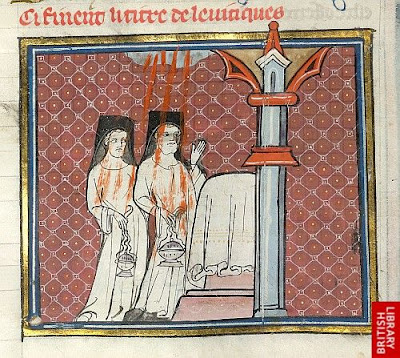
New Cartoon

Labels: humor
Biblical Studies Carnival 14

Don't miss Biblical Studies Carnival XIV, now up and available on Chris Weimer's blog, Thoughts on Antiquity (click here). Chris has done a great job summarizing posts related to academic biblical studies in the month of January 2007. Thanks for your mentions of this blog, Chris!
Sunday, February 04, 2007
Update: Renk Theological College
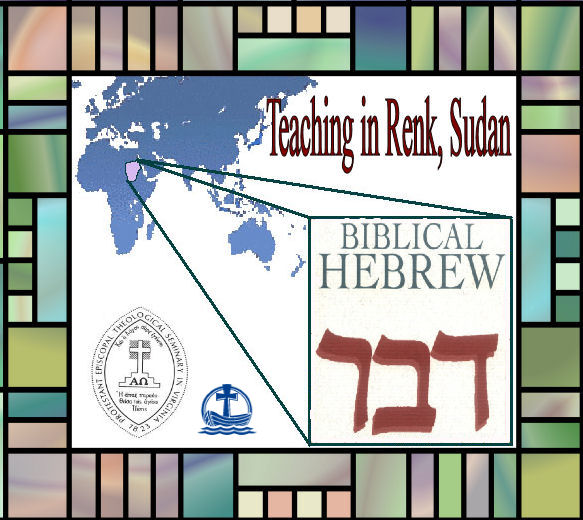
Update: We've just had an email from Renk, Sudan, from the principal of the College there, Father Joseph Garang Atem. The big news is that Renk "Bible College" has a new name and status. It is now "Renk Theological College." I'll try to post some additional news about Renk and the programs that VTS and Duke Divinity have there in coming days. ---SLC
Saturday, February 03, 2007
Sermon from Last Sunday (Jeremiah 1)

Friday, February 02, 2007
Hurray!!!! New I-171H Approval!!!

After months of frustration, the US-CIS came through late in the day today. We have our new approval from the U.S. federal government. Our visas from the Chinese consulate came through at the start of this week, and yesterday our agency (Barker) received our travel approvals from CCAA in Beijing. That's it. We have all our approvals now in hand, and are authorized to travel. Hurray!!!!
Barker has put in requests for appointments with the American Embassy/Consulate at Guangzhou, People's Republic of China requesting either a late February or early March visit. We should hear very soon the exact dates of our trip!!!!
New Picture!!!

From the picture, you can tell she is not doing bad at all in the SWI! She has real baby toys to play with and a real nanny giving her special attention in the "First Hugs" program. Fu Xuan is clearly drawn to music! If music comes on as she is playing with toys, she’ll put down the toys and swing to the beat!
As of November, she heavily into tasting everything, tasting the world: she bites everything she grabs, no matter if it’s the pacifier or her nanny's hand. When her nanny says “ouch” in response to her bite, she feels triumphant!
Fu Xuan also knows about cause and effect. She can communicate with her nanny to take her to the light switch, and once there, she loves to turn the lights on and off over and over again.
It is also wonderful to hear that she knows her caretakers and is wary of strangers. It is a sign of healthy attachment that she’ll cry when she sees strangers.
Thursday, February 01, 2007
5 Epiphany, Year C: Isaiah 6:1-13

Let's be brave and start our reflections with the most difficult section. The lectionary makes verses 9-13 of our passage optional, and one has to ask why. Do we fear that people in the pews are not tough enough to hear its harsh message? Are we unwilling to accept God as Isaiah presents God to us?
The message of Isaiah 6:9-13 is hard: Amazingly, Isaiah's foremost task is not to win the people's repentence. It is to allow God's word to harden people's hearts, thus making them ripe for God's judgment.
One can certainly protest and search for guidance on how to hear this word, but what one cannot do is claim that this God of Isaiah is somehow different from the God of Jesus. If you check out passages such as Matthew 13:10-17; Mark 4:10-12; Luke 8:9-10; John 12:40; and Acts 28:25-29, you quickly see that we have a theological insight here deeply imbedded in both testaments of the Christian Bible.
Part of the theological mystery here concerns how sin is its own punishment. The path of sin, once started upon, leads one down the road into greater insensitivity to sin and deeper entanglement in it. Callousness is enhanced the more it is exercised; the more one rubs a callous, the more numb and larger it becomes. Abraham Heschel saw this clearly. Heschel wrote that the divine word can have the negative effect of intensifying or extending what people have done to their own souls.
Heschel saw a positive note in this dark truth, however. He believed that the act of enhancing people's callousness may bring them to see how deep they have sunk into sin. If the burden of callousness can become unbearable for them, perhaps they may decide to be honest with themselves and others and seek to change. If the hardness can become complete, and lead to despair, prayer will burst forth.
It would be wonderful if God's word could simply be delivered and received by people with true integrity and receptivity. Unfortunately, real life is not so simple. People constantly work to "domesticate" God's word, to make it a more comfortable word, a word that allows them to retain some control. People do not want to do the hard work of grappling with difficult truth and radically transforming their form of life. It is a rare person who will greet God's word on its own terms, and devote oneself to hearing it aright.
For most of us, then, unfortunately, God's puzzling, foreign, hard sayings come to us first and foremost in a way that makes us ripe for judgment. How can we deal with this? We must learn to understand this judgment as an opportunity to truly know ourselves as sinners. We must accept this judgment, ultimately, as an expression of God's grace.





